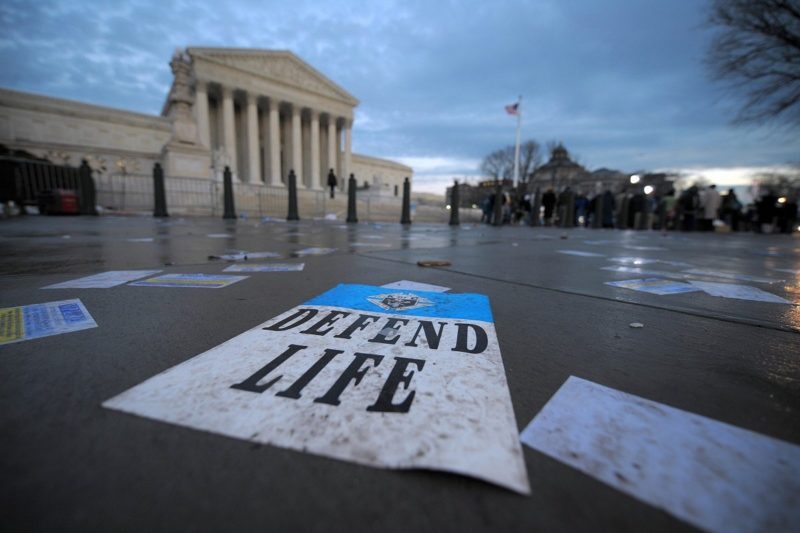Lawsuit Challenges Anti-Choice Laws Passed by Louisiana Lawmakers
The lawsuit comes in the wake of the U.S. Supreme Court’s landmark decision that struck down two provisions of Texas’ omnibus anti-choice law known as HB 2.

The Center for Reproductive Rights filed a lawsuit Friday in federal district court challenging abortion restrictions passed by Louisiana lawmakers this year.
Despite facing a budget crisis, lawmakers passed seven laws that restricted access to reproductive health care, including abortion services, which the Center for Reproductive Rights claims “individually, and cumulatively” unduly restrict the “constitutional right to abortion.”
Nancy Northup, president and CEO of the Center for Reproductive Rights, said in a statement that the laws collectively create a “web of red tape” that restrict women’s ability to access reproductive health care.
“Louisiana politicians are trying to do what the U.S. Supreme Court just ruled decisively they cannot, burying women’s right to safe and legal abortion under an avalanche of unjustified and burdensome restrictions,” Northup said.
The lawsuit comes in the wake of the U.S. Supreme Court’s landmark decision that struck down two provisions of Texas’ omnibus anti-choice law known as HB 2.
Stephen Griffin, a constitutional law professor at Tulane University, told the Times-Picayune that the Supreme Court’s ruling on HB 2 was a “strong rebuke” of the Fifth Circuit Court of Appeals that upheld the law.
“I think the Louisiana law and any similar laws are going to be struck down,” Griffin said. “[Justice Ruth Bader] Ginsburg filed a reminder to courts that the five-member majority is going to be looking very skeptically at targeted regulation of abortion providers.”
Among the laws challenged is a law similar to Texas’ HB 2.
HB 488 requires that physicians providing abortion care be licensed to practice medicine in Louisiana and that they be board-certified or board-eligible in obstetrics and gynecology or family medicine. Previously, the law required that a physician be licensed to practice medicine in Louisiana and be currently enrolled in or have completed a residency in obstetrics and gynecology or family medicine.
The bill was sponsored by Rep. Katrina Jackson (D-Monroe), who in 2014 authored the state’s Texas-style admitting privileges law. The law is the subject of another Center for Reproductive Rights lawsuit, and is currently blocked by a Supreme Court decision.
Ben Clapper, executive director of Louisiana Right to Life, told the Times-Picayune that the Supreme Court’s ruling on HB 2 “does not predict a favorable forecast” for a similar law passed in Louisiana.
“The sad thing here as we see it is that these judges are replacing the elected officials and the legislative process as the determiner of what is medically important or not,” Clapper said. “We don’t believe that’s how it should be.”
Among the other laws challenged include those that restrict abortion procedures, require a waiting period before an abortion, impose restrictions on the handling of fetal tissue, and ban public funding for organizations that provide abortion services.
HB 1081 targets a procedure known as dilation and evacuation (D and E), which is frequently used during second-trimester abortions. A growing number of states have passed laws to ban the procedure, while state courts have blocked such measures passed by GOP lawmakers in Oklahoma and Kansas.
HB 386 tripled the state’s waiting period for a pregnant patient seeking an abortion from 24 hours to 72 hours.
HB 1019 prohibits a person from intentionally performing or attempting to perform an abortion with knowledge that the pregnant patient is seeking the abortion solely because the “unborn child” has been diagnosed with either a genetic abnormality or a potential for a genetic abnormality.
HB 815 prohibits the buying, selling, and any other transfer of the “intact body of a human embryo or fetus” obtained from an induced abortion. The law also prohibits the buying, selling, and any other transfer of “organs, tissues, or cells obtained from a human embryo or fetus whose death was knowingly caused by an induced abortion.”
In addition, it “require[s] burial or cremation of remains resulting from abortion,” which acts as a de facto medication abortion ban, since an embryo miscarried at home, through medication abortion, cannot in practice be buried or cremated.
SB 33, similar to HB 815, prohibits the sale, receipt, and transport of fetal organs and body parts obtained from an induced abortion. Any person who violates this provision would be sentenced to a term of imprisonment at hard labor between ten to 50 years, at least ten years of which must be served without benefit of probation or suspension of sentence, and may, in addition, be required to pay a fine of not more than $50,000.
HB 606 prohibits entities that perform abortions from receiving public funding, unless the abortion was necessary to save the life of the pregnant patient, the pregnancy was a result of incest or rape, or the pregnancy was diagnosed as “medically futile.”
Most of the bills were passed with significant bipartisan support, and were signed into law by Gov. John Bel Edwards (D). Each of the laws is set to take effect on August 1.
”We are asking the district court to immediately block these unconstitutional laws,” Northup said.

